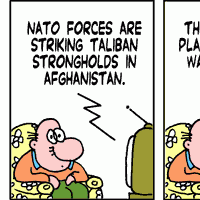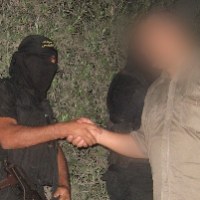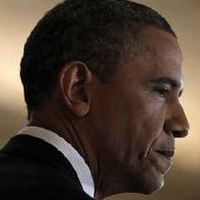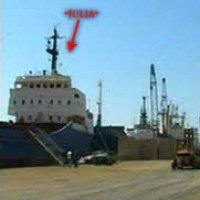Thu, July 15, 2010 | IDFSpokesperson
Videos Timeline of Flotilla Incident as Presented by Eiland Team of Experts (English Version), 13 July 2010
Below are videos of the Gaza flotilla incident as presented by the Eiland team of experts with English subtitles.
The film, produced by the Eiland Team of Experts, breaks down the events of the flotilla using a timeline that alternates between 3D models and footage captured throughout the incident.
Flotilla Incident Timeline (English: Part 1 of 2)
httpv://www.youtube.com/watch?v=TwoqGJJltPU
The events leading up to and throughout the flotilla incident are recounted in the video, as presented by the team of experts led by Maj. Gen. (res.) Giora Eiland in the IDF’s internal inquiry.
In light of weapons smuggling attempts, a maritime closure was established during the 2008-2009 Gaza Operation. Under the guise of providing humanitarian aid, a number of ships have attempted to reach the Gaza Strip, some permitted to enter, while others were stopped.
Due to these attempts, the IDF General Staff and Navy outlined orders to prepare for future attempts to break the closure, and in preparing for the May 31st flotilla, the IDF planned far in advance with extended discussion, and various simulation model scenarios. IDF attaches abroad and foreign attaches to Israel were all briefed in advance.
In addition, the Chief of the General Staff, Lt. Gen. Gabi Ashkenazi sent a letter to the Defense Minister and Prime Minister emphasizing the following:
“Cooperation between nation ministries is required and the military option which includes seizing, confiscating and detaining the ship’s activists is a last resort and at a low priority.”
The video goes on to describe the various ships in the flotilla and the courses of their attempted journey to the Gaza Strip, as well as the number and extent of Israeli response ships, aircraft, and absorption center for the ships’ passengers.
The video also outlines the orders given to the IDF soldiers boarding the flotilla ships, including the policy of using gradual force, and using live weapons only in life threatening scenarios.
The first phase of the operation: The IDF relayed the message that the flotilla ships were in an area of a maritime closure, and offered the ships to transfer their cargo from the Ashdod Port to the Gaza Strip. The Sofia ship did not respond at all, while the other ships responded with refusal and/or profanity.
The IDF forces were divided and each group boarded a different ship. The soldiers arrived at the Mavi Marmara at 4:28 AM, but could not board the ship due to metal objects being thrown at them, and electric buzz saws used by the demonstrators to slice the ladders IDF soldiers needed to board the Marmara. After an unsuccessful attempt to board the ship by smaller boats, a helicopter arrived at 4:30 AM with 15 IDF soldiers. The first rope dropped by the helicopters was tied by the demonstrators to the deck of the ship in order to prevent the soldiers’ descent.
Flotilla Incident Timeline (English: Part 2 of 2)
In Part 2 of the Eiland Presentation, the final phases of the flotilla incident are recounted
httpv://www.youtube.com/watch?v=BpPvs3YSE4g
Soldiers that descended down the second rope were met by 2-4 demonstrators each who wielded knives, axes, and metal poles. The second soldier to descend was shot in the stomach by a demonstrator. The soldiers who were in danger of their lives were forced to use their live weapons. Five soldiers were injured by stabbing, blows and live fire by the demonstrators. Within seconds of boarding the ships, three soldiers were thrown off the deck by demonstrators. The injured were dragged to the hull of the ship.
A reinforcement of soldiers arrives from a second helicopter, which is also attacked by demonstrators, and the soldiers are met with violence when they attempt to access the lower deck of the ship.
At 4:46 AM a third helicopter arrives to the Mavi Marmara, and the two groups of soldiers combine forces on the ship roof and descend to the other parts of the ship, where they are also met with lethal violence, and thus respond with live fire.
Many of the demonstrators enter inside of the ship as the smaller boats arrive at the side of the ship, however some still violently attack the incoming boats and the soldiers respond with live fire.
The Commander of the Special Navy Forces boards the ship, and while evaluating the forces, it is discovered that three soldiers are missing. The missing and injured soldiers are discovered to have been abducted by a number of violent demonstrators, who abandon the soldiers and run back into the ship when fired at.
Two of the injured soldiers jump off the ship so that they can be picked up by the IDF boats. The third injured soldier is on the bow of the boat and slipping out of consciousness. IDF soldiers remaining on the boat come to his aid.
At 5:17 AM the situation is evaluated and some of the findings: live fire was used by demonstrators towards IDF soldiers who were on the ship, including one soldier who descended down the rope and was shot in the abdomen. Live fire by the demonstrators was also aimed at the soldiers on the small Israeli Navy boats next to the Marmara. The first occurence of live fire was that used by the demonstrators. In addition, a gun with emptied magazines was found in the hull of the ship.
IDF forces had boarded the other ships without incident. Treatment and evacuation was carried out for the injured soldiers and demonstrators alike. 38 injured were airlifted, 7 of them soldiers.
The three soldiers who had been attempted to be kidnapped and were taken to the hull of the ship were witness to an argument between the violent demonstrators, and other passengers of the Marmara who asked the violent demonstrators to cease their violent activity.
24 of the injured passengers were diagnosed at the Ashdod Port and treated in hospitals in Israel.
After the operation ended, the ships arrived at the Ashdod Port accompanied by Israeli Naval forces. An intelligence investigation following the flotilla incident found that 40 of the IHH activists previously boarded the Marmara ship from Istanbul before joining the others.
The 8 of the 9 demonstrators killed were members of the IHH or other allied groups. Around half of those killed had declared in front of their families their aspiration to die as martyrs (“shahids”). Footage on the Marmara shows that the violence had been prepared: metal poles and chains were prepared, slingshots, buzzsaws, gas masks, tear gas, bulletproof vests, knives, and more. A briefing had taken place before the IDF had boarded the ship, with the leader of the violent demonstrators telling the group to attack the IDF soldiers at any cost.
There were 718 total passengers of the flotilla ships. Most were released without undergoing any investigation. The last passenger left on June 6th.



 RSS
RSS










Videos Timeline of Flotilla Incident as Presented by Eiland Team of Experts #israel #gaza #flotilla http://j.mp/9uSnsT
RT @CrethiPlethi: Videos Timeline of Flotilla Incident as Presented by Eiland Team of Experts #israel #gaza #flotilla http://j.mp/9uSnsT